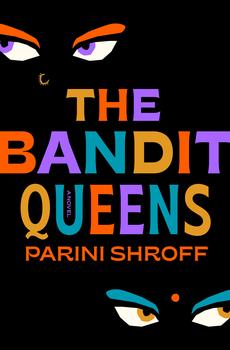Summary | Excerpt | Reading Guide | Discuss | Reviews | Beyond the book | Read-Alikes | Genres & Themes | Author Bio

A Novel
by Parini ShroffGeeta's been branded a churel — a revenge-seeking mythological being — by her Indian village because her abusive husband, Ramesh, disappeared five years ago and everybody assumes she murdered him. The story always varies: Did she feed him to stray dogs? Poison him? The village can think what they want; Geeta didn't kill him, but after suffering his abuse, being viewed as a murderous widow seems like the most freedom she has experienced in her whole life. That is, until some other women want to get rid of their own horrible husbands as well, and they think Geeta is the perfect candidate to help execute them. She soon finds herself blackmailed into becoming an accomplice for a crime that has never been a part of her resume. In other words, Geeta realizes she's in deep shit, and somehow, the pile keeps getting deeper and deeper. Parini Shroff's The Bandit Queens is a darkly comedic tale about female friendship and women's empowerment that upholds respectful discourse about violence against women in India and the systems that perpetuate that brutality.
Shroff's novel is a delicate tightrope act, always balancing on the line between comedy and tragedy. It quickly won my heart in engaging with sexism and casteism gracefully. Seamless dialogue reads as if it's from a binge-worthy Netflix series and descriptions perfectly encompass the author's balanced approach. Her acerbic wit and cheekiness surprised me throughout the novel, and I often felt like the third–person narrative was both its own character and a friend of mine. Describing an abusive man trying to seem amicable to Geeta, Shroff writes, "The amount of bullshit that fell from that fucker's mouth could fertilize half of India." In this passage, the man in question has "turned his life around" and tries to appear like an apologetic husband in the public eye. The village sees the turn-around as some romantic fantasy, and the man becomes a sort of hero. However, Geeta and the women around her can see right through him and refuse to forget how dangerous and volatile he can be. The joke is on the ridiculousness of the town, not the women hurt because of the village-wide reaction.
In another section, Shroff mentions an interaction between Geeta and Khushi. Khushi is a Dalit woman. She and others belonging to the Scheduled Castes cannot touch those in a higher caste, as anything they touch is considered "polluted":
"I have company," Khushi said. They were of Khushi's ilk, the unspoken information tracking beneath her words like subtitles, and Geeta's caste would necessitate uncomfortable adjustments. They wouldn't be able to sit on furniture in her presence, instead standing in deference before moving to the ground.
In this passage, which is tonally more delicate than the quote about the abusive man, the reader can see that Shroff knows when and when not to employ humor, so as to keep it from diluting her story. I greatly appreciated her tact in tackling grave topics.
The Bandit Queens at its core is about the ways women push against the systems created to disempower them, all while banding together to navigate these systems and come out stronger than if they had battled them alone. "The unfortunate status quo is that it is tough for women everywhere, and female friendships are what will carry us through the darkness and absurdity of life," Shroff writes in her Author's Note. She continues, "Such connections, however, are not always easily forged in a world keen to divide, mark, and label as 'other.'" To fight the intersectional experiences of oppression that coincide with womanhood, while recognizing that different identities present intrinsically different struggles, is a form of great strength. As Shroff's novel shows, to push against multiple oppressive forces and find genuine friendship in it all is not only beautiful, but it is how we survive.
![]() This review was originally published in The BookBrowse Review in March 2023, and has been updated for the
January 2024 edition.
Click here to go to this issue.
This review was originally published in The BookBrowse Review in March 2023, and has been updated for the
January 2024 edition.
Click here to go to this issue.

If you liked The Bandit Queens, try these:

by Maria Reva
Published 2025
Set in Ukraine, an eccentric scientist breeding rare snails crosses paths with sisters posing as members of the marriage industry to find their activist mother. As Russia invades, they embark on a wild journey with kidnapped bachelors and a last-of-its-kind snail. This darkly comic novel explores survival, love, and the impact of war.

A Serial Killer's Guide to Marriage
by Asia Mackay
Published 2025
Two former serial killers trying to keep their past buried realize that old habits die hard in this "wildly original, razor-sharp thriller" (Chris Whitaker, New York Times bestselling author of All the Colors of the Dark).
Your guide toexceptional books
BookBrowse seeks out and recommends the best in contemporary fiction and nonfiction—books that not only engage and entertain but also deepen our understanding of ourselves and the world around us.